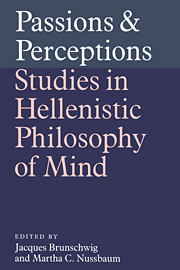Book contents
- Frontmatter
- Contents
- Preface
- Avant-propos
- Part I ETHICS AND PSYCHOLOGY OF HEDONISM
- Chapter 1 Epicurean hedonism
- Chapter 2 Annicéris et les plaisirs psychiques. quelques préalables doxographiques
- Part II ATOMISM AND EPICUREAN PSYCHOLOGY
- Part III THE PASSIONS
- Part IV STOIC PSYCHOLOGICAL CONCEPTS
- Bibliography
- Subject index
- Name index
- Index of passages cited
Chapter 1 - Epicurean hedonism
Published online by Cambridge University Press: 22 September 2009
- Frontmatter
- Contents
- Preface
- Avant-propos
- Part I ETHICS AND PSYCHOLOGY OF HEDONISM
- Chapter 1 Epicurean hedonism
- Chapter 2 Annicéris et les plaisirs psychiques. quelques préalables doxographiques
- Part II ATOMISM AND EPICUREAN PSYCHOLOGY
- Part III THE PASSIONS
- Part IV STOIC PSYCHOLOGICAL CONCEPTS
- Bibliography
- Subject index
- Name index
- Index of passages cited
Summary
Hedonism, like pleasure, can take many forms, and its fundamental tenet, ‘pleasure is the good’, is notoriously open to different interpretations. Also, the advice, moral and otherwise, given to people who try to pursue this good may vary a great deal, depending on one's view of what pleasure is. To say that a certain philosopher is a hedonist, therefore, is not yet to say much about the content of his doctrine. Still, one would at least expect a hedonist's conception of happiness to be that of a recognizably pleasant life. Epicurus' form of hedonism has seemed paradoxical from the beginning, because it does not seem to meet even this modest expectation. In his own time, the Cyrenaics maintained that what he held to be the greatest pleasure was in fact more like the state of someone asleep (Diogenes Laertius II 89) or even dead (Clemens Alexandrinus Stromateis II.21; Us. Fr. 451). Cicero was certainly not the first to argue that Epicurus' doctrine was incoherent, and his prescriptions for a pleasant life inconsistent with his principles. Plutarch devoted an entire treatise to showing that one cannot even lead a pleasant life following Epicurus' doctrine.
The difficulty both ancient and modern critics have felt lies in seeing how Epicurus could present his claim that the highest good was a state of absence of pain and trouble from body and soul, as a version of hedonism.
- Type
- Chapter
- Information
- Passions and PerceptionsStudies in Hellenistic Philosophy of Mind, pp. 3 - 17Publisher: Cambridge University PressPrint publication year: 1993
- 1
- Cited by



